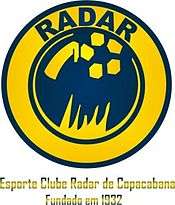EC Radar
 | ||
| Full name | Esporte Clube Radar | |
|---|---|---|
| Founded | 1981 | |
| Dissolved | 1991 | |
| President | Eurico Lira | |
|
| ||
Esporte Clube Radar was a Brazilian professional women's association football club, based in the Copacabana neighbourhood of Rio de Janeiro, Brazil. Founded in 1981, they enjoyed unprecedented success in the early days of women's football in Brazil, winning both the Taça Brasil de Futebol Feminino and the Campeonato Carioca de Futebol Feminino on six consecutive occasions during the 1980s. Additionally, they would barnstorm in high profile, televised challenge matches against other Brazilian women's teams.
The club functioned as the Brazil women's national football team at the 1986 Mundialito and the 1988 FIFA Women's Invitation Tournament.
History
The women's football club was founded in 1981, initially as a beach soccer team, by Eurico Lira; a promoter and entrepreneur who owned the Radar Sports Club on the Copacabana, founded in 1932.[1][2]
In 1983 a local rivalry developed with the women's team of Bangu Atlético Clube, who were put together by gambling baron Castor de Andrade. After the referee failed to award Bangu a penalty in the away match at Estádio Moça Bonita the situation descended into violent disorder involving players, staff, match officials, journalists and spectators. The referee and his assistants had to leave the stadium under armed guard, while Radar's full–back Rosa suffered a broken jaw.[3][4]
The final of the 1983 national competition, Taça Brasil de Futebol Feminino, at Estádio da Rua Bariri also erupted into violence. Radar's opponents Goiás were upset by the antics of flamboyant referee, Jorge José Emiliano dos Santos.[5]
Eurico Lira funded a club tour to the United States by selling two of his Manabu Mabe paintings for below their estimated value.[6] In 1988 Lira got Brazilian Football Confederation (CBF) authorisation to represent Brazil at the 1988 FIFA Women's Invitation Tournament, but no additional funding, so he again paid the expenses of the team, who finished third.[7]
All but two of the Brazil squad picked for the 1991 FIFA Women's World Cup were contracted to Radar.[8] Lira, who had attended the tournament as the CBF women's football co–ordinator, left his position after the World Cup. Placar magazine reported that one of the players, Marcinha, had accused Lira of embarking upon a sexual affair with another player.[9]
Lira died in 1997, from injuries inflicted during the course of a robbery at the Radar Club.[10]
References
- ↑ Leal, Ubiratan (15 August 2007). "Radar" (in Portuguese). Balípodo.com.br. Retrieved 23 April 2013.
- ↑ Fernandes, Andréa Karl. "A história do futebol feminino" (PDF) (in Portuguese). Sindicato dos Treinsdores de Futebol Profissional do Estado do Rio de Janeiro. Retrieved 24 April 2013.
- ↑ "Confusão no futebol feminino" (in Portuguese). Bangu.net. Retrieved 24 April 2013.
- ↑ Votre, Sebastião; Mourão, Ludmila (2004). "Women's Football in Brazil: Progress and Problems". Soccer, Women, Sexual Liberation: Kicking off a New Era. Frank Cass. p. 300. Retrieved 24 April 2013.
- ↑ ""Fantástico" - Pancadaria no futebol feminino (1983)" (in Portuguese). YouTube. Retrieved 24 April 2013.
- ↑ Mello, Euclydes (28 September 2006). "Histórias e casos de sedução no futebol feminino". Um Sabado No Paraiso Do Swing (in Portuguese). Casa da Palavra. p. 123. Retrieved 23 April 2013.
- ↑ "Dance moves". CNN Sports Illustrated. 17 June 1999. Retrieved 23 April 2013.
- ↑ "FIFA Women's World Cup China '91 - Technical Report & Statistics" (PDF). FIFA. p. 79. Retrieved 23 April 2013.
- ↑ "O dono do Radar". Placar (in Portuguese) (1119): 26. 1 September 1996. Retrieved 23 April 2013.
- ↑ "Futebol Feminino: Saad goleia Paulista por 8 a 0". Futebol Interior. Retrieved 23 April 2013.